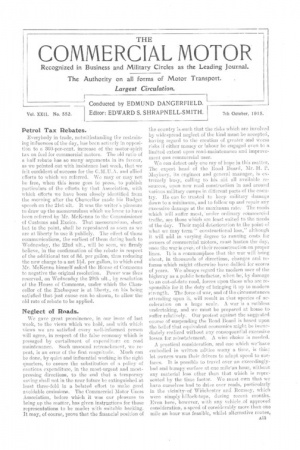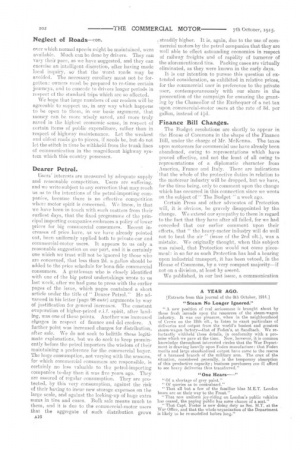Petrol Tax Rebates. •
Page 1

Page 2

If you've noticed an error in this article please click here to report it so we can fix it.
Everybody in trade, .notwithstanding the restraining influences of the day, has been actively in opposition to a 300-per-cent. increase of the motor-spirit tax on fuel for commercial motors. The old ratio of a half rebate has so many arguments in its favour, as we pointed out with insistence last week, that we felt confident of succeSs for the C.M.U. A. and allied efforts to which we referred. 'We may or may not be free, when this issue goes to press, to publish particulars of the efforts by that Association,with which efforts we have been closely identified from the morning after the Chancellor made his Budget speech on the 21st ult. it was the writer's pleasure to draw up the memorandum which we know to have been referred by Mr. McKenna to the Commissioner of Customs and Excice. That memorandum, short but to the paint, shall be reproduced as soon as we are at liberty to use it publicly. The effect Of those communications, the earliest of them dating back to Wednesday, the 22nd ult., will be seen, we firmly believe, in the confirmation of the rebate in respect of the additional tax of 8d. per gallon, thus reducing the new charge to a net 14,-d. per gallon, to which end Mr. McKenna himself asked the House of Commons to negative the original resolution. Power was thus reserved, on Wednesday the 29th tilt., by resolution of the House of Commons, under which the Chancellor of the Exchequer is at liberty, on his being satisfied that just cause can be shown, to allow the old rate of rebate to be applied.
Neglect of Roads. •
We gave great prominence, in our issue of last week, to the views which we hold, and with which views we are satisfied every well-informed person will agree, in respect of the false economy which is presaged by curtailment of expenditure on road maintenance. Such unsound retrenchment, we repeat, is an error of the first, magnitude. Much con be done, by quiet and-influential working in the right quarters, to ensure the substitution of a. policy of cautious expenditure, in the most-urgent and mostpressing directions, to the end that a temporary saving shall not in the near future be extinguished at least three-fold in a belated effort to make good avoidable emissions. The Commercial Motor Users Association, before which it was our pleasure to bring up the matter, has given in.structions for those .representations to be made.: with suitable backing. It may, of course, prove that, the financial position of the country is such that the risks which are involved by widespread neglect of the kind must be accepted, having regard to the creation of greater and WOfSe risks if either money or labour be engaged even to a limited extent upon road-maintenance, and improvement ri ita commercial user.
We can detect only one ray of hope in this matter.. The expert head of the RoadBoard, Mr. H. P. -Maybury, its engineei and general manager, is extremely busy, calling to his .aid all available resources, upon new road construction in and around various military camps in different part's of the country. He can be trusted to keep military damage down to a minimum; and to follow-up and repair any -excessive damage at the maximum rate: The roads -which vii1 suffer most, -under ordinary commercial traffic, are those which are least suited to the needs of the clay. Their rapid deterioration ta.the point of what we May term " constructional loss,'' although it will add. in varying degree to running costs for owners of commercial 'Motors; must hasten the day,, one,e the war is Dyer, • of their reconstruction on proper lines. It is a commonplacethat the war will bring about, in thousands of -directions, changes and re:forms which might otherwise have .dallied for scores of years. We always regard the modern user of the highway as a public benefactor, \Olen he by damage to an out-of-date road, forces upon those who are responsible for it the. duty of bringing it up to modern strength. The force of war, and of the circumstances attending upon it, will result in that species of acc-eleration on a huge scale. A war is a ruthless undertaking, and we Must be prepared at home to suffer relatively. Our protest against the suggested course of suspending the Road Board is based upon the belief that equivalent economies might be immediately realized without any consequential excessive losses for. reinstatement. A wise choice is needed.
A practical consideration, and one which we-have embodied in written adkice many atime, is this let owners warn their drivers to adapt speed to sur. faces. It is possible to travel over an exceedinglybad and bumpy surface at one mil&an hour, without any material loss .other than that which is repre.sented by the time factor. -We must own that we have ourselves had to drive over roads, particularly in the vicinity, of Wiriehester and Ramsey, which were simply hillock-tops, during recent months. ,Even here, however, with any vehicle o{ approved consideration, a speed of considerably more than one mile an hour was feasible, whilst alternative routes, over which normal speeds might be maintained, were available. Much can be done by drivers. They can vary their paceeas we have suggested, and they can exercise an intelligent discretion, after having made local inqUirY, -.So' that the Worst reads may be avoided. The necessary corollary .must not be forgotten: owners must be prepared to re-time certain journeys, and to concede to drivers longer periods in respect of the standard tripe which are so affected.
We hope that large numbers of our readers will be agreeable to support us, in any way which happens to be open to them, in our basic argument., that money can be more wisely saved, and more truly saved in the highest economic sense, in respect of certain items of public expenditure, rather than in respect of highway maintenance. Let the weakest end oldest roads go to pieces, if needs be, hut do not let the stitch in time be withheld from the trunk lines of communication in the magnificent highway system which this country possesses.
Dearer Petrol.
Users' interests are measured by adequate supply and reasonable• competition. Users are suffering, and we write subject to any correction that may-reach us as to the intentions of the petrol-importing companies, because there is no effeetive competition where motor spirit is concerned. We know, in that we have beenin touch with euch matters from their earliest days, that the fixed programme of the principal importing companies embraces a policy of lower prices for big commercial consumers. Recent increases of price have, as we have already pointed out, beei-e uniformly applied both to private-car and commercial-motor users. It appears to us only a reasonable suggestion on our part, and it is certainly one which we trust will-not be ignored by those who are concerned; that less than 2d. a, gallon should be added to. the price schedule for bona-fide commercial consumers. A gentleman who is closely identified with one of the big petrol undertakings wrote to us last week, after we had gone to press with the earlier pages of the issue, which pages contained a short article under the title of " Dearer Petrol." He advanced in--his letter (page 98 ante) arguments by way of justification for general increases. The constant evaporation of higher-priced e.i.f. spirit, after landing, was one of these points. Another wee increased charges in respect of finance and del credere. A further point was increased charges for distribution, after sale. We do not seek to belittle these legitimate explanations, hut we do seek to keep prominently before the petrol importers the wisdom of their maintaining a. preference for the-. commercial buyer. The huge consumption, not varying with the seasons, for which commercial consumers are responsible, is certainly no less valuable to the petrol-importing companies to-day than it was five years ago. They are assured of regular consumption. They are pro7 tected, by this very e.onSumption, against the risk of their having to incur new storage expenses on the large scale, and against the locking-up of huge extra GUMS in tins and cases. Bulk sale means much to them, and it is due to the commercial-motor users that the aggregate of sudh distribution grows Ad6 steadily higher. It is, again, due to the use of commercial motors by the petrol companies that they are well able to effect astounding economies in respect of railway freights and of rapidity of turnover of the aforementioned tins. Packing cases are virtually eliminated, as they were known in the early days.
It is our intention to pursue this question of extended consideration, as exhibited in relative prices, for the commercial user in preference to the private user, contemporaneously with our share in the prosecution of the campaign for ensuring the granting by the Chancellor of the Exchequer of a net tax upon commercial-motor users at the rate of 3d. per gallon, instead of 40.
Finance Bill Changes.
The Budget resolutions are shortly to appear in the House of Commons in the shape of the Finance Bill, under the charge of Mr. McKenna.. The taxes upon motorcars for commercial use have already been abandoned, owing to representations which have proved effective, and not the least of all owing to representations of a. diplomatic character from America, France and Italy. There are indications that the whole of the. protective duties in relation to the motorcar industry will be dropped, but we have, for the time being, only to comment upon the change which has occurred in this connection since we wrote on the subject of " The Budget " a week ago, Certain Press and other advocates of Protection will, it is obvious, be gravely disappointed by the change. We extend our sympathy to them in regard to the fact that they have after all failed, for we had conceded that our earlier continent Upon their efforts, that " the heavy-motor industry Will do well not. to beat, the air "(issue of the 2nd tilt.), was a mistake. We originally thought, when this subject was raised, that Protection would not come piecemeal in so far as such Protection has had a bearing upon industrial transport, it has been vetoed, in the House of Commons, by a very compact majority—if not on a division, at least by ascent.
We published, in our last issue, a communication




















